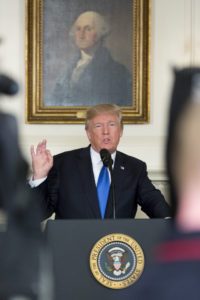
President Donald Trump is warning the Iran nuke deal must be fixed, or else. Illustrative. (Official White House Photo by D. Myles Cullen)
120 days from now and the international Iran nuclear deal could be dead if Europe and the United States can’t agree on a revised approach to the Islamic Republic. US President Donald Trump last Friday waived sanctions against Iran as part of their involvement in the deal, but the American leader warned in comments posted to the White House website it would be the last time he would do so without a supplemental international agreement that toughens restrictions on the Iranian nuclear and missile programs. According to media reports in The Independent and others publications, President Trump’s next opportunity to address sanctions is 120 days later.
“I am waiving the application of certain nuclear sanctions, but only in order to secure our European allies’ agreement to fix the terrible flaws of the Iran nuclear deal,” said Trump on Friday. “This is a last chance. In the absence of such an agreement, the United States will not again waive sanctions in order to stay in the Iran nuclear deal.”
Trump’s warning was heard clearly in Israel, and they’re already telling Europe to listen too.
Israeli Prime Minister Benjamin Netanyahu spoke with French President Emmanuel Macron on Saturday evening. According to a summary of that talk posted to Prime Minister’s Office spokesman Ofir Gendelman’s Twitter feed, Netanyahu told Macron that “Trump’s statement should be taken seriously and that those who wish to keep the deal should fix it.”
A senior US administration official said in separate comments that a US-Europe agreement on Iran must include restrictions on Iran’s ballistic missile program, limitations to keep Iran’s expected nuclear weapons “breakout period”—the time it would take to rapidly develop such weapons if they chose to do so—to at least a year and removing the “sunset clause” that concludes nuclear inspections after a set number of years.
That official, whose comments on condition of anonymity were also posted to the White House website, said they’ve already been discussing the issue with European allies. “So those [talks] have been quite far advanced in terms of making clear to our European allies what we expect of them, and also in agreeing on an assessment of the nature of the Iranian problem, and in seeking a collective way forward to try to counter the different aspects of that problem,” said the official.
Trump has also called upon Congress for revised legislation threatening sanctions on Iran that addresses similar concerns and that’s not all he ultimately wants to see. In his comments, Trump called upon all American allies to cut off all funding to the Islamic Revolutionary Guard Corps, designate all of Hezbollah—not just its so-called military wing—as a terrorist organization and take other steps to address Iran’s destabilizing activities around the globe.
Meanwhile, US Representative to the United Nations Nikki Haley also called upon that international body to address Iranian missile activity, support for terror, human rights violations and other misdeeds. Even though the Iranian nuclear deal prohibits certain sanctions on Iran in exchange for their cooperation in the agreement, Haley said addressing the other concerns can still “be taken outside of the nuclear deal.” But if the world refuses to cooperate to keep from upsetting the Iran deal, Haley warned the nuclear pact isn’t worth the cost.
“If we cannot achieve international consensus on [addressing the non-nuclear concerns], then it will become even clearer that the nuclear deal is an impediment to peace,” said Haley. “We must not allow the Iranian regime to use the nuclear deal to provide it with cover to violate all manner of international norms and UN resolutions.”
(By Joshua Spurlock, www.themideastupdate.com, January 14, 2018)
